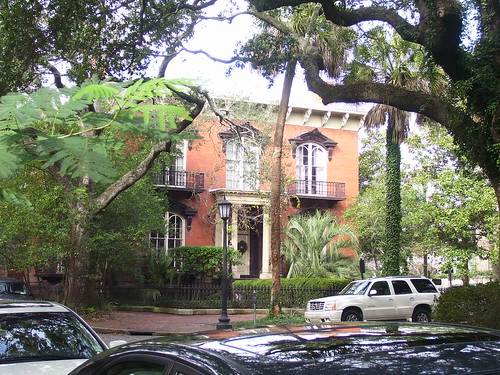The Mercer House, originally uploaded by Deden Rukmana.
The following article was firstly published in the Business Report & Journal -a weekly business publication covering Savannah, The Lowcountry, Coastal Empire, Bruncwick and the Golden Isles- on Volume 10, Issue 1, May 21-27, 2007.
Metropolitan Planning Commission’s Planning Academy
Deden Rukmana
The Chatham County-Savannah Metropolitan Planning Commission provides a good opportunity for all citizens to learn more about planning through the MPC Planning Academy consisting of eight two-hour sessions over four months. The program started on April 10, 2007 and will end on July 10, 2007. I applaud this initiative since the citizen’s knowledge about the principle of planning and the local planning processes is quite important to better shaping the future of our community.
Planning as a systematic attempt and actions in the public domain to shape the future is best implemented when all stakeholders including community are involved. The planning practice in the 21st century is facing greater challenges than that in the 20th century. Some of the challenges are the complexity of the problems and the elusiveness of solutions to those problems. A better way of shaping the future of the community is no longer primarily based on the sense of order, comprehensibility, predictability and rationality that prevailed in the modernist era. The postmodernist era in the 21st century requires more communicative aspects of planning practice.
Recent planning practice requires planners to more actively communicate information and ideas to the many people and stakeholders with whom they interact and receive information and ideas in return. The Planning Academy is indeed one way of communicating information and ideas about the local planning practice and processes from the planners at the MPC to the community. It also should be a way of interaction between the planners and the participants that will allow the planners to receive the information and ideas from the participants. The knowledge about the principle of planning and the local planning processes from the Planning Academy will allow the participants to engage in a better communication with the planners in shaping the future of the community.
There are 63 participants including presidents of neighborhood associations, elected officials and concerned citizens who are enrolled in the MPC Planning Academy. The number of participants is more than what was expected by the MPC. The strong responses indicate high demand from the community for the communication in the local planning practice. The eight sessions of the MPC Planning Academy should be good venues for communication between the planners and the participants. Both parties should learn from each other for better planning practice in Savannah and Chatham County.
Bird and Savannah's port, originally uploaded by Deden Rukmana.
The MPC also needs to do research concerning the demographic profiles of the respondents. They need to identify which neighborhoods and subpopulations are still not represented in the Planning Academy. The local planning is not only for a particular neighborhood or subpopulation but for everyone in Chatham County. The unrepresented neighborhoods or subpopulation should be involved in the next planning education for the citizens.The current MPC Planning Academy should be the beginning of the continuing planning education for the citizens. Planning education programs with more specified purpose also need to be considered for example planning education program on the provision of affordable housing. Planning is also a way to correct market failure including the lack of affordable housing. There have been always conflicts between affordable housing developers and the neighborhoods when the developer plans to develop affordable housing units in the neighborhoods. A planning education program on the provision of affordable housing will provide a venue for communication between the developers, the residents and the planners. The communication is to build consensus among divergent interests to better provide affordable housing for the community.
There are many other planning issues that need to be communicated with divergent stakeholders including transportation planning, economic development, historic preservation and environmental planning. The MPC Planning Academy should be a good venue to initiate the communication among divergent interest for better shaping the future of our community.
Deden Rukmana, Ph.D. is an assistant professor of urban studies at Savannah State University. He can be reached at rukmanad@savstate.edu


No comments:
Post a Comment